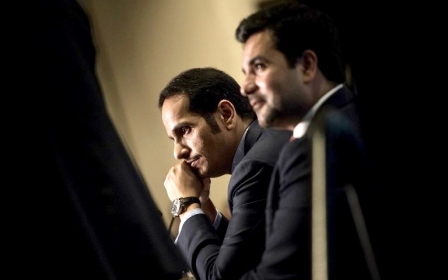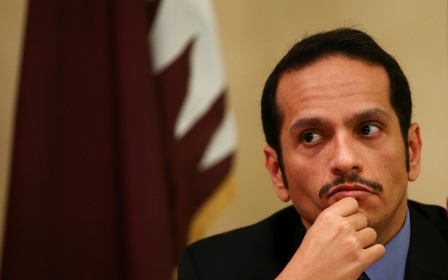Gulf crisis: Qatar rejects ultimatums as Saudi axis extends deadline

Qatar on Monday responded to a list of demands from Saudi Arabia and its allies after they agreed to give a defiant Doha another 48 hours to address their grievances.
Details of the response were not immediately available, but a Gulf official told AFP that Qatari Foreign Minister Sheikh Mohammed bin Abdulrahman al-Thani had delivered it during a short visit to Kuwait, which is acting as a mediator in the crisis.
Saudi Arabia, the United Arab Emirates, Bahrain and Egypt had announced in the early hours of Monday they were pushing back a deadline for Qatar to agree to a list of 13 demands they issued on 22 June.
A joint statement said they were extending the ultimatum, which had been due to expire at the end of the day on Sunday, at the request of Kuwait's emir.
The demands included Doha ending support for the Muslim Brotherhood, closing broadcaster Al Jazeera, downgrading diplomatic ties with Iran and shutting down a Turkish military base in the emirate.
Sheikh Mohammed had earlier said the list of demands was "made to be rejected".
"Everyone is aware that these demands are meant to infringe the sovereignty of the state of Qatar," he announced on SAturday.
The Saudi axis announced on 5 June the severing of ties with Qatar, accusing it of backing "terrorism" and being too close to Saudi Arabia's arch-rival Iran.
Demands against Qatar include ending support for the Muslim Brotherhood, the closure of Al Jazeera television and other media groups, a downgrade of diplomatic ties with Iran and the shutdown of a Turkish military base in the emirate.
The four countries announced on 5 June they were severing ties with their Gulf neighbour, accusing it of backing "terrorism" and being too close to Saudi Arabia's arch-rival Iran.
Riyadh and its supporters have already severed air, sea and ground links with Qatar, cutting off vital routes for imports including food.
Concerns about stability
The foreign ministers of the axis countries were meanwhile preparing to travel to Cairo for a meeting on Wednesday - one day beyond the extension of the deadline.
Donald Trump, the US president, meanwhile said he had spoken to the leaders of Saudi Arabia, Abu Dhabi and Qatar in phone calls on Sunday.
The White House said Trump "reiterated the importance of stopping terrorist financing and discrediting extremist ideology. The president also underscored that unity in the region is critical to ... defeating terrorism and promoting regional stability."
The crisis has raised concerns of growing instability in the region, home to some of the world's largest energy producers and several key Western allies hosting US military facilities.
The imposed restrictions have caused turmoil in Qatar, an oil- and gas-rich nation dependent on imports to meet the basic needs of its population of 2.7 million, the BBC said. As a result, Iran and Turkey have been increasingly supplying it with food and other goods.
Germany's foreign minister, Sigmar Gabriel, who was in Jeddah, Saudi Arabia on the first lef of a tour of several Arab states, called for a "serious dialogue" to end the crisis.
"We are worried that the distrust and the disunity could weaken all the parties concerned as well as the entire peninsula," said Gabriel, who will visit Saudi Arabia, the UAE and Qatar.
"An agreement on ending any kind of support for terrorist or extremist organisations" would be the best solution to the crisis, Gabriel told reporters after a two-hour meeting with his Saudi counterpart Adel el-Jubeir.
"We all know that (this support) is not organised by states, but often by private persons," he added. "But we must somehow succeed in ending support in the region for extremist and terrorist organisations."
Gabriel's comments appear to be a climbdown from comments he made last week where he described the list of 13 demands as "a very provocative list."
Gabriel had told the event hosted by the European Council on Foreign Relations in Berlin last Monday that some of the demands being made of Qatar were negotiable, but others clearly challenged its sovereignty.
It is unclear what further measures will be taken if Qatar fails to meet the demands, but the UAE ambassador to Russia, Omar Ghobash, warned last week that further sanctions could be imposed.
Separately, a German government spokesman said on Monday that Saudi Arabia's King Salman bin Abdulaziz will not attend a 7-8 July summit of the Group of 20 leading global economies in Hamburg, Germany, providing no reason for the decision.
Steffen Seibert said the Saudi government had notified Berlin that the 81-year-old monarch would not participate in the annual meeting of G20 leaders.
New MEE newsletter: Jerusalem Dispatch
Sign up to get the latest insights and analysis on Israel-Palestine, alongside Turkey Unpacked and other MEE newsletters
Middle East Eye delivers independent and unrivalled coverage and analysis of the Middle East, North Africa and beyond. To learn more about republishing this content and the associated fees, please fill out this form. More about MEE can be found here.




